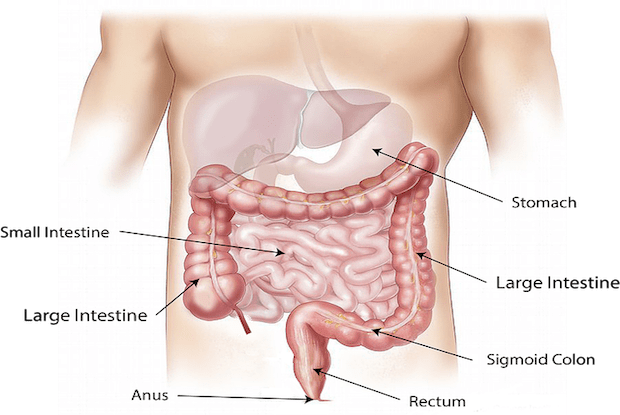Table of Contents
The Function of the Bowel
Irritable bowel syndrome (IBS) is an unpleasant gastrointestinal condition that affects 25 to 45 million people across the United States. Worldwide, ten to fifteen percent of the world’s population has IBS. [1] This common disorder affects the large intestine and creates many painful and uncomfortable symptoms. Symptom severity varies from person to person, but several medications are available to improve a person’s lifestyle, including Xifaxan (rifaximin), Linzess (linaclotide), and lubiprostone.
Before we dive into the risk factors and symptoms of IBS, it is important to understand the bowel's function. The bowel is an essential part of the digestive system and helps digest the food we consume. Once minerals and nutrients are absorbed in the body, the bowel helps expel the waste that the body does not use.
Once food enters our body, it takes between 24 to 72 hours to push the food through the intestines. Peristalsis (muscle contractions) moves the food through the small intestine and then into the colon, or large intestine. The large intestine is the final portion of the small intestine and goes all the way to the rectum. Its main job is to store, process, and dispose of waste. IBS occurs when there are disruptions in this area of the bowel. [2] Read on to learn more about the symptoms and risk factors for IBS.
According to doctors, there is no exact cause for irritable bowel syndrome. Those who suffer from IBS may develop this condition for several reasons, such as: Abnormal muscle contractions: As mentioned above, muscles within the intestines are essential in transferring food and waste throughout the intestinal tract. If these contractions are not working properly, they can cause IBS symptoms. Some contractions that last longer than normal cause gas and bloating, whereas weak contractions can slow food passage and cause hard and dry stools. Gut microbes: The gut is full of millions of bacteria, fungi, and viruses which play a key role in the body's health. The balance of this microbial environment is vital to your digestive health, and those with IBS may have different microbes than those without IBS. Nervous system: People with IBS may have nervous system problems that cause greater discomfort in the abdomen when their stomach stretches from gas or stool. This occurs when nerve signals between the brain and intestine cause the body to overreact to changes in the digestive process. [3] There are several irritable bowel syndrome symptoms. Fatigue, difficulty sleeping, food intolerance, and anxiety may present themselves along with the following bowel symptoms: Pain and cramping is the most common IBS symptom. This pain is present in the lower abdomen and is less likely to occur in the upper abdomen. After a bowel movement, this pain often decreases. Diarrhea-predominant IBS affects around one-third of irritable bowel patients. Those with this type of IBS have around 12 bowel movements a week, which is twice the number of people without IBS. Constipation-predominant IBS is present in around 50 percent of IBS patients. If the communication between the brain and bowel is altered, the stool's transit time through the intestines can slow. Pain often accompanies this constipation and can lead to unnecessary straining. Gas and bloating commonly occur when there is increased gas production in the gut. This leads to uncomfortable bloating and cramping, which is more common in women with IBS. Gas and bloating occur in around 83 percent of IBS patients. [4] IBS can affect anyone, but several things make a person more likely to develop this bowel disease. Common risk factors for IBS include: There is not a specific test to determine IBS. If you suspect you have IBS, you may want to keep a detailed list of your symptoms to make the most of your doctor appointment. Your doctor may use the Rome criteria, which involves asking you several questions about the frequency and severity of your symptoms. If you have abdominal pain with increased defecation for at least one day a week for three weeks, you likely have IBS. If your doctor is concerned about your condition, they may perform other diagnostic procedures, including a colonoscopy or x-ray. A colonoscopy involves inserting a small, flexible tube into the intestine to view the colon for any abnormalities. An x-ray can also help rule out any other reasons behind your stomach issues that are not IBS-related. [3] Because IBS is so prevalent, there are several medications available to assist in symptoms. Xifaxan (rifaximin) is one medication that is approved for the treatment of diarrhea-predominant IBS and traveler's diarrhea. This drug is an antibiotic absorbed into the stomach and acts on bacteria in the intestines, relieving symptoms of abdominal pain and diarrhea. [6] Linzess (linaclotide) and lubiprostone may be used for bowel problems like IBS and chronic constipation. Both drugs increase the fluid in the intestines and improve the movement of food in the gut. This movement reduces incomplete bowel movements and symptoms like bloating and abdominal pain. Talk to your doctor to determine the right medication for your treatment plan. [7] The content in this article is intended for informational purposes only. This website does not provide medical advice. In all circumstances, you should always seek the advice of your physician and/or other qualified health professionals(s) for drug, medical condition, or treatment advice. The content provided on this website is not a substitute for professional medical advice, diagnosis, or treatment.
Why does IBS Occur?
Symptoms of IBS

Risk Factors for IBS
Diagnosing IBS

Medications
